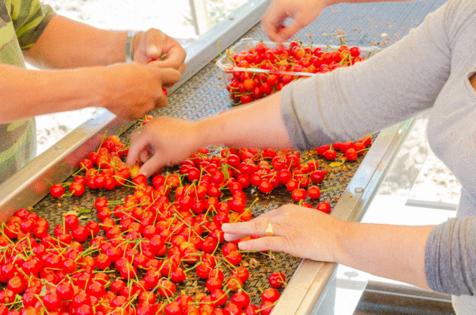WA's 'shot across the bow' on guest workers targets Yakima-area farm
Published in Business News
A Toppenish, Washington, farm faces legal action brought by the state attorney general’s office following allegations managers hired guest workers rather than local farmworkers while also discriminating against women working there.
The state started investigating Cornerstone Ranches about two years ago, after seeing what it contends was an uptick there in hiring of migrant laborers in the U.S. under a federal guest worker program.
Cornerstone harvests 30 million pounds of apples and 1 million pounds of hops yearly. To help with labor, it has been using the H-2A visa program to bring in migrant workers for temporary agricultural roles since 2015.
Last month, state Attorney General Nick Brown’s office brought a civil rights lawsuit against the farm. The state claims Cornerstone violated Washington’s law against discrimination by unfairly favoring H-2A workers while working to remove local workers, especially women.
It also alleged the farm told local job seekers there was no available work, and failed to disclose the pay rate and hours of H-2A contract jobs, breaching the state Consumer Protection Act.
Cornerstone “strongly disputes the claims made in the attorney general’s complaint,” farm owner Graham Gamache said by email.
The H-2A program is difficult to navigate and opens up the farm for inspections, Gamache continued. Cornerstone, he said, has “averaged 3-5 pop up audits/inspections a year.”
In an interview, Gamache said the company has never discriminated against women, and women have held and do hold positions at every level of the 1,200-acre ranch.
“I reject that claim absolutely, and we will show it is biased on skewed statistics drawn from incomplete data,” Gamache said.
Brown’s office was alerted to the case by the Northwest Justice Project, a state-funded program that provides legal aid to low-income individuals, which had heard from workers in the community that the farm was laying off many employees, said Alyson Dimmitt Gnam, an assistant attorney general involved in the case. It then began investigating, including collecting payroll information from the company records.
Cornerstone payroll records showed the average weekly hours worked by women at Cornerstone dropped by 39% from June 2022 to April 2023, according to the attorney general’s office.
In fall 2021, local workers performed 91% of farm labor, according to the attorney general’s office. By fall 2023, the office stated, that percentage shrank to 59%. In that time period, the office said Cornerstone doubled its number of H-2A workers while telling local laborers no work was available.
Gamache said the payroll data is incomplete and misrepresented by the state. Employment of domestic workers has increased every year since the company first started using the H-2A program, he continued.
Dimmitt Gnam said the office has identified over 100 workers who lost their jobs at Cornerstone by either being laid off or fired. In the lawsuit, the state claims more than 1,000 local workers were lied to about available work at the farm.
The H-2A federal program allows employers to bring foreigners to the U.S. to fill temporary agricultural jobs. To qualify, employers have to prove the job is temporary or seasonal, and that there are not enough U.S. workers who are able, willing or available to do the job.
Employers also must prove that employing foreign workers won’t undermine the wages and working conditions of similarly employed U.S. workers. The program was established in 1987.
Last year, 384,900 H-2A positions were certified nationwide, according to the American Farm Bureau Federation. The U.S. Department of Agriculture found that in 2022 there were 2.6 million jobs directly on farms.
In 2022, Washington ranked fourth among the states with available H-2A jobs, accounting for 9% of all H-2A jobs.
The American Immigration Council found that from 2017 to 2022, the number of certified H-2A workers grew nearly 65%. Since then, the number of workers has only increased. A recent bill from U.S. Rep. Dan Newhouse, the Washington Republican whose district includes Toppenish, would expand the visa program by allowing migrant workers to obtain legal residency after completing a certain amount of agricultural labor.
As the program expands, Dimmitt Gnam said the state has seen more growers abusing it. Although she said protecting local workers is the office’s top priority, there is also heightened concern when dealing with H-2A cases because migrant workers are particularly vulnerable.
“This is a shot across the bow of the industry to make sure that Washington employers are following the law,” Dimmitt Gnam said.
The state is asking the Yakima County Superior Court to declare Cornerstone violated the Washington law and federal consumer act, block the farm from “continuing unlawful practices” and provide relief for harmed Washingtonians.
Dimmitt Gnam said it is too early to estimate total compensation the state is seeking. The state recently resolved a lawsuit against King Fuji Ranch, a Richland orchard and vineyard, resulting in a $180,000 payout. It also brought a similar case against Ostrom Mushroom Farm in 2023. The Sunnyside firm agreed to pay $3.4 million to settle the suit.
©2025 The Seattle Times. Visit seattletimes.com. Distributed by Tribune Content Agency, LLC.












Comments